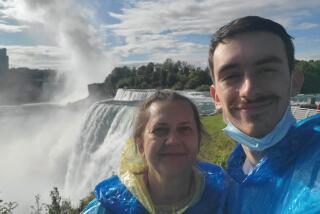To Catch a Killer : Violence: Onnik Kouyoumdjian was shot to death beside his mother’s grave. Almost two years later, frustrated detectives and his family announce a $100,000 reward in hopes of uncovering a suspect.
- Share via
Onnik Kouyoumdjian had received threatening phone calls and suspected he was being followed. He told friends someone was trying to kill him. He was so frightened that he would not move out of his modest apartment near a busy Hollywood thoroughfare and into the sprawling Hollywood Hills home he had just purchased.
One of the few places he felt safe was at his mother’s grave, which he visited every week. But early one Saturday morning as he was kneeling beside the grave, holding a dozen red roses, he was shot to death in what police said appeared to be a professional hit.
On Tuesday, almost two years after Kouyoumdjian’s death, police returned to Forest Lawn Memorial Park, Hollywood Hills, and announced a $100,000 reward for information leading to the arrest and prosecution of the killer.
At the time of the killing, there was one grave near the scene. Now there are two. Kouyoumdjian, a wealthy shoe manufacturer, was buried beside his mother in an enormous marble tomb.
The case has frustrated detectives, who have interviewed more than 200 people and spent thousands of hours on the investigation. It has also tormented Kouyoumdjian’s relatives, who have put up the reward in hopes that the money will unearth a lead, a suspect or a clue that might have been missed during the lengthy investigation.
“Killing someone at their mother’s grave is so coldhearted. . . . It’s about as cold as you can get,” said Wendi Berndt, the lead detective on the case. “You should at least be able to visit a loved one’s grave and feel safe. But the killer violated that. That’s what sets this case apart and gives the detectives a special motivation.”
At the time of his death, Kouyoumdjian, 53, a bachelor, was embroiled in a bitter lawsuit with a former business partner, Berndt said.
Kouyoumdjian had bought the partner out, Berndt said, but sued him when the partner reneged on the buyout agreement. After Kouyoumdjian was killed, his surviving relatives won the suit and were awarded several million dollars. The former partner, and a few others named in the suit, were investigated, but there was insufficient evidence to bring charges, Berndt said.
The Saturday he was killed, on a Labor Day weekend, Kouyoumdjian had decided to visit his mother’s grave about 8 a.m. before heading to his office. An hour later, visitors found him face down on the grave, riddled with bullets, the dozen roses damp from the dew.
“It was so early on a weekend morning that no one saw anything and no one heard anything,” Berndt said. “This has been very frustrating for his sisters. The hurt hasn’t left them for one day or one minute.
“They call me almost every day and cry: ‘Please, please Miss Wendi. Find the person who did this.’ ”
In many ways, Kouyoumdjian, an Armenian immigrant, appeared to have achieved the American dream. His first job after immigrating to Los Angeles in 1968 was at a Hollywood shoe store. He saved his money and eventually purchased a shoe store and then another, friends said.
To increase his profit margin, he opened a shoe factory in Los Angeles. Kouyoumdjian, whose father and grandfather were shoemakers, soon began designing shoes. His designs were featured in many department stores and exclusive women’s shops.
“He was a dynamite businessman--very aggressive and very smart,” said Berj Torossian, general manager of Kouyoumdjian’s shoe manufacturing company. “As a boss, he was tops. I’ve never had a better one. If you worked hard for him, you got treated incredibly well.”
When he was killed, Kouyoumdjian owned a mansion with a swimming pool and a sweeping view of the city. But he continued to work six or seven days a week, 12 hours a day, Torossian said.
“He was always working, either in his office or on the road visiting the sales territory,” he said. “Work was his passion in life.”
More to Read
Sign up for Essential California
The most important California stories and recommendations in your inbox every morning.
You may occasionally receive promotional content from the Los Angeles Times.










